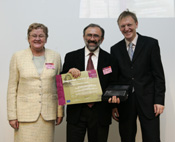 |
| Professor Costas Soukoulis with the European Commissioner for Research J. Potocnik and E. Ergma (president of of the Descartes Grand Jury for Research) (Photos Wachholder) |
09/12/2005
Greek professors Costas Soukoulis, from the Foundation for Research and Technology - Hellas (FORTH), and Ioannis Seiradakis, from the Aristotle University of Thessaloniki, are among those awarded the European Descartes Prize for excellence in scientific research and in science communication, in a ceremony that took place on December 2nd, 2005, in London. In the final shortlist were also projects involving Dimitris Niarchos, Director of the Hellenic National of Scientific Research (NCSR) "Demokritos", and Professor Stavros Katsanevas from the French Centre National de la Recherche Scientifique (CNRS).
The Descartes Prize is an initiative of the European Commissions Directorate-General for Research, within the framework of the "Science and Society" Programme. In this years competition for the Descartes Prize, the entries amounted to 85 projects and 76 research teams coming from a total of 22 countries (Europe, USA, Japan, the Russian Federation, Singapore, South Africa), while for the Descartes Prize for the science communication, 63 proposals were submitted from 16 countries.
The evaluation of the research works was done by a pan-European Grand Jury, composed by representatives of the academic and industrial community with Dr Ene Ergma, Vice-President of the Estonian Academy of Sciences, acting as President. Also present in the ceremony was the Commissioner for Research Janez Potocnik, who underlined that the research teams taking part in the awarding of the Descartes Prize are living proof of the fact that research of the highest quality can be achieved only with the cooperation of the brightest of scientists and the combination of equipment and frameworks. Such research results would have not been possible with the resources of one country alone.
This year?s winners in the sector of research, who will share the amount of 1.000.000 euro, are:
- EXEL: this research team, with Prof. C. Soukoulis at its head, developed artificial metamaterials, known as "Left-Hand Materials" (LHMs), which have fascinating properties, including negative index or refraction. Possible applications include, among others, flat and light lenses, microscopes and miniature appliances such as lower intensity antennae for mobile phones. Commenting on the awarding of his scientific team, Prof. C. Soukoulis highlighted the fact that the Descartes Prize, the first such distinction for Greece, is a great honour. A special mention was made on the significant support of the EU towards high risk-high reward projects.
- CECA: this work concerns inter-scientific research actions for the climatic and environmental change in the Arctic. During the awarding, the Norwegian professor Ola M. Johannessen underlined the significant contribution of Russian scientists in this work, as the team acquired for the first time ever access to data for specific regions of the Arctic. In recognition of the Russian contribution the money from the Descartes Prize will fund new scientists from Russia for the incorporation of Russian?s scientific community into the EU.
- PULSE: this work, in which participated Prof. I. Seiradakis from the Aristotle University of Thessaloniki, concerns the discovery and study of pulsars, often described as "cosmic clocks". In the last five years, the researchers have spotted more than 850 pulsars (most than those discovered in total in the past 30 years), as well as the first ever double pulsar.
- ESS: this is the first sociological project ever to be awarded the Descartes Prize. Its aim is the formation and sanction of a common methodology for interstate sociological research. During the awarding, Professor Roger Jowell highlighted that the prize is a significant recognition of the contribution of social sciences not only in the understanding of society, but also the development of all sciences.
- EURO-PID: this work concerns the research on 130 rare genetically determined diseases. The researchers of this work highlighted that for these significant research results the contribution of scientists was as significant as that of patients from all over Europe.
With regard to Greek researchers who made it to the final shortlist, the HIDEMAR work, in which D. Niarchos of NCSR "Demokritos" participates, concerns the design and production of high-density nano-patterned magneto-recording media, using nano-lithographic techniques and chemical self-assembling of nano-particles. Also, the research team of the HESS work, coordinated by Prof. S. Katsanevas from CNRS, occupied itself with the development of an innovative telescope system in the Astrophysics sector of high-energy gamma rays for the observation of the furthest objects of the Universe.
In the sector concerning the promotion of science, the following were awarded: Carl Johan Sundberg and Anja C. Andersen for the popularisation of science in a wider audience, Jos Van Hemelrijck for the Belgian television programme "Overleven", Bill Bryson for his book A Short History of Nearly Everything and Michael Seifert for his series of lectures "Children?s University" in the University of Tubingen. The winners shared a monetary award worth 250.000 euro.
Editor: Georgia Tzenou

 News-Events
News-Events
 R&D News
R&D News

